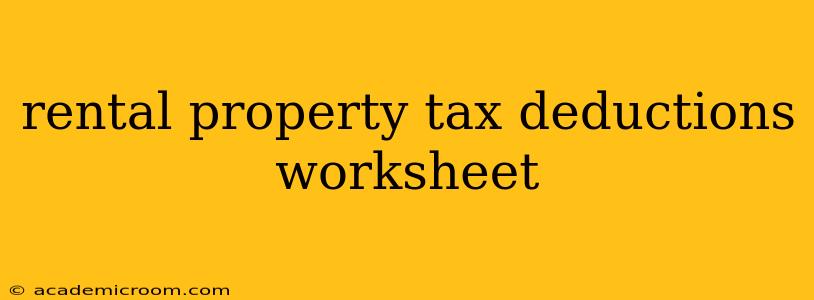Navigating the world of rental property taxes can feel overwhelming, especially when it comes to understanding which deductions you can claim. This comprehensive worksheet will guide you through the process, ensuring you maximize your tax benefits and minimize your tax burden. Remember, this worksheet is for informational purposes only and does not constitute tax advice. Always consult with a qualified tax professional for personalized guidance.
What Expenses Can I Deduct on My Rental Property?
This is often the first and most crucial question for landlords. The IRS allows you to deduct a wide range of expenses related to your rental property, broadly categorized as either direct or indirect expenses.
Direct Expenses: These are costs directly associated with the operation and maintenance of your rental property. Examples include:
- Mortgage Interest: Interest paid on loans specifically used to purchase or improve your rental property.
- Property Taxes: Real estate taxes assessed on your rental property.
- Insurance Premiums: Costs for homeowner's or landlord insurance.
- Repairs and Maintenance: Costs to repair or maintain the property, excluding capital improvements (discussed below). Think fixing a leaky faucet or replacing a broken appliance.
- Depreciation: This allows you to deduct a portion of your property's value each year to account for its wear and tear over time. The depreciation calculation can be complex, and professional advice is often recommended.
- Advertising Costs: Expenses incurred to attract tenants, such as advertising fees in newspapers or online platforms.
- Cleaning and Pest Control: Costs associated with cleaning the property between tenants and managing pest infestations.
- Utilities (If Paid by Landlord): If you pay for utilities like water, sewer, or garbage collection, you can deduct these expenses.
Indirect Expenses: These are costs not directly tied to the property but are necessary for its operation as a rental. Examples include:
- Travel Expenses: Costs associated with traveling to inspect your property or manage it.
- Accounting and Legal Fees: Expenses related to managing your rental property's finances and legal matters.
- Professional Management Fees: If you hire a property management company, you can deduct the fees they charge.
What About Capital Improvements?
Capital improvements are expenses that substantially increase the value of your property or extend its useful life. These are not immediately deductible; instead, they are added to the property's basis and depreciated over time. Examples include:
- Adding a new bathroom or bedroom.
- Installing a new roof.
- Constructing a new driveway.
How Do I Calculate My Depreciation?
Depreciation is a complex topic and one of the most significant deductions available to rental property owners. The method used and the depreciable amount depend on factors like the property's useful life, its cost basis, and the date it was placed in service. It is strongly advisable to consult a tax professional or use specialized depreciation software to accurately calculate this deduction.
What is the Difference Between Repairs and Capital Improvements?
This is a crucial distinction for tax purposes. Repairs are routine maintenance that keeps the property in good working order, while capital improvements are substantial enhancements that add value or extend the life of the property. A leaky faucet is a repair; a complete kitchen remodel is a capital improvement.
Can I Deduct Losses from My Rental Property?
Yes, you can deduct losses from your rental property, but there are limitations. Generally, rental losses can be used to offset other income, up to $25,000 annually, subject to certain passive activity loss rules.
What Records Do I Need to Keep?
Maintaining meticulous records is crucial. Keep copies of all receipts, invoices, bank statements, and any other documentation supporting your expenses. The IRS requires you to keep these records for at least three years from the date you file your return.
What Forms Do I Need to File?
You'll primarily use Schedule E (Supplemental Income and Loss) of Form 1040 to report your rental income and expenses.
Where Can I Find More Information?
For detailed information and official guidance, consult IRS Publication 527, Residential Rental Property. You should also consult with a tax professional for personalized advice tailored to your specific situation.
This worksheet provides a foundation for understanding rental property tax deductions. Remember to consult with a qualified tax professional to ensure you are taking advantage of all applicable deductions and complying with all relevant tax laws. Accurate record-keeping is crucial for a successful tax filing process.
